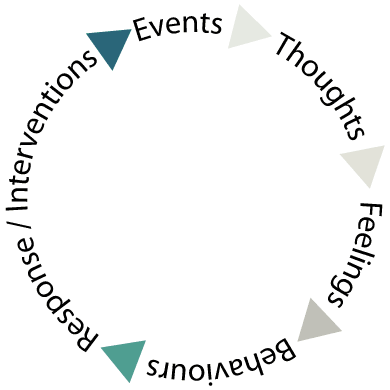“Anger is one letter short of danger.”
–Eleanor Roosevelt
Feeling angry is a normal and healthy emotion and is not a problem in itself. Anger is an emotion that can range from mild annoyance to intense rage. How we cope with and express uncontrolled anger can either spur us into addressing our responses (personally) and it’s impact/consequences on our relationships (family). Anger can be viewed as: a) event b) mood c) resentment d) verbal abuse e) physical abuse f) retaliation g) communication breakdown. Even this is an over simplification of a complex chain of events that can lead to the ‘death of a relationship.’
What causes anger…
Think of anger as a cycle… it’s a reaction to a feeling… but it’s more than that too.
Using a framework used by Cognitive Behaviour Therapists, the process or Framework of Cognitive Distortions – Automatic Thoughts may be viewed as follows:
When we break it down there are sequences/questions to be asked…
- What is it (event ) that gets to you and pushes your buttons?
- What are your resulting thoughts?
- What do your thoughts bring out in your feelings? (Embarrassment, Hurt, Sadness, Frustration, Stress, Jealousy, Fear)
- What does anger do to you behaviourally ?.. maybe it’s the ‘fight/flight’ response…
- What do you do about anger? Do you retaliate, scream/yell, get physical, threaten, throw objects, seek solace in alcohol/drugs? Important question….how would or does your partner respond to your actions? Play that video in your mind…How would you sum up the scene? Most likely it’s not a pleasant one.
- OK, what could you do differently and constructively?
“Anger is a sign that something needs to change.”
-Mark Epstein
When is anger a challenge?
When anger creates challenges/difficulties in your dealings with other people at some level i.e. personally, socially or at work. It can lead to poor communication or misunderstandings which can result in anger.
What are the signs that anger may be a problem?
- Feeling angry a lot or most of the time
- Anger involves some or all of the following…verbal, emotional, physical or psychological abuse
- Anger is leading to difficulties in relationships ie personal or professional/work
- Anger lingers after the trigger event has passed
- Anger has that flow on effect into situations other than the original event
- Feeling anxious or depressed about your anger
- Using alcohol or drugs to manage anger
- Using anger as a way of getting what you want
- Using anger as a ‘power trip’ to ensure you have the upper hand
What are the symptoms of anger?
- Tightness in the chest
- Pounding heart
- Sweating
- Shaking
- Gritting your teeth
- Raising of your voice
- Pacing
- Clenching of hands
- Breathing becoming more rapid
- Being defensive or snappy
- Bouts of losing your sense of humour
- Being over critical of loved ones or other people
- Feeling argumentative
Using anger management, and what is it?
‘Anger management’ isn’t about ignoring your feelings or waiting for the moment to pass.
It is about how to deal with anger more effectively and reducing the degree (of anger) that is being experienced – ‘not letting the pot get too full and its contents spilling over or where it reaches boiling point.’
Tips for managing your anger…
- Count to 30 (or more) – It’s about diverting your thinking for a short time so that you can avoid getting caught up in the moment and venting your anger.
- Time out! – When anger starts building is the perfect time to walk away from the situation. Change the scenery, deep breaths, calming your mind and body. If possible both parties should create a little space.
- Think before you speak. It’s so easy to get caught up in the heat of the moment. This is the dangerous time when words are spoken that cannot be taken back and regret can come into its own.
- Get physical – by that I mean get some exercise! Physical exercise helps to reduce stress. If you feel the anger rising, it’s time to start walking, fast, or running. That pent up anger needs an outlet to burn itself out! If going to the gym is an option, then keep it enjoyable. Meeting gym buddies certainly couldn’t hurt.
- Download an app to help you unwind. You could try the Reachout Breathe app or you may be able to find others through research and enquiry. Meditation is excellent if you are able to relax.
- What was the event all about? What led to the feelings of anger? Remember the Framework Distortions – Automatic Thoughts as highlighted above. Practice it religiously when it all gets a little too much. This method could help you with future problem solving in various aspects of your life. Persevere.
- When you are calm is the time to address what made you angry. This is the time to introduce “I feel” statements rather than attack the other person (verbally).
- Address the behaviour rather than focusing on the person. Address the situation – distance yourself emotionally and look at the issue as a challenge that has been written down and placed on the table in front of you both for discussion.
- Problem solving should be a collaborative process where strategies leading to the resolution of an issue is the objective.
- Communication is everything! A good way of productive/positive communication is to introduce the ‘sandwich method’ of good communication. By this you look at the two layers of (bread) which are positive statements. In between is the filling where a concern or issue in brought into the discussion. So, you have a positive layer, the matter that’s an issue (negative layer), followed by another positive layer. There is more about this aspect of communication in my blog articles.
- Home is your sanctuary. If the problems arose from outside influences, the rule is, where possible, to leave frustrations at the door. Home is for calmness, respect and safety.
- If there is still an ongoing problem and your anger is escalating, seek counselling from a reputable and qualified therapist. Together you and your therapist can find a way to create a more positive relationship by exploring some of the culprits that may have led to your anger ie depression, anxiety, stress, history of violence. You are entitled to a better life and so are those close to you.
“Fear is the path to the dark side. Fear leads to anger, anger leads to hate, hate leads to suffering.”
-Yoda



